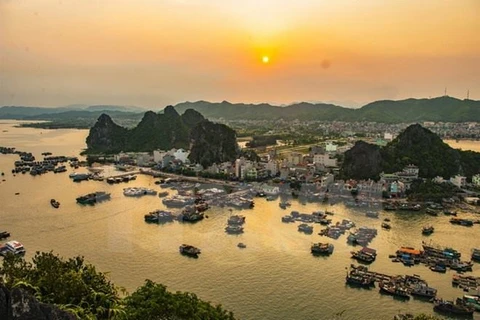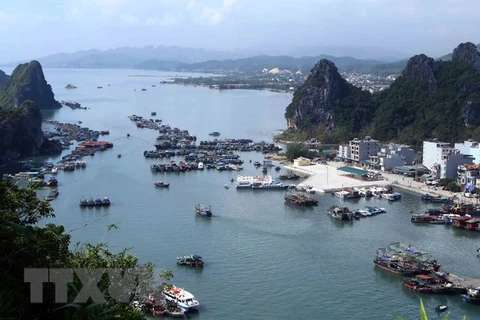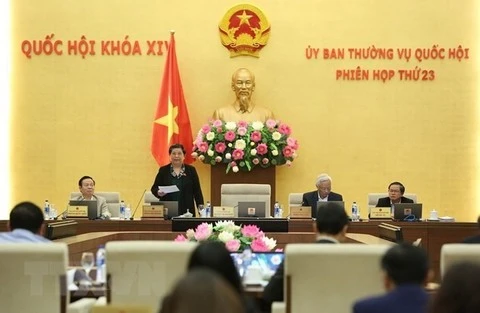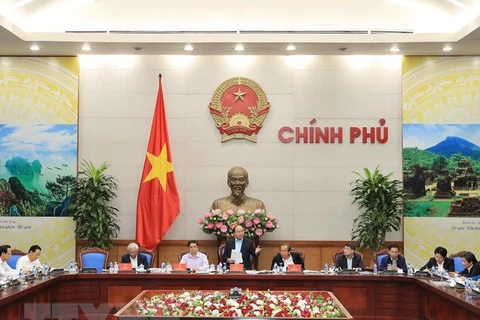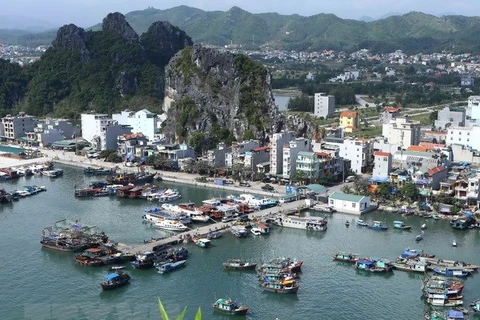 A view of Cai Rong wharf in Van Don district, Quang Ninh province. Van Don is set to become one of the three special administrative-economic zones of Vietnam (Photo: VNA)
A view of Cai Rong wharf in Van Don district, Quang Ninh province. Van Don is set to become one of the three special administrative-economic zones of Vietnam (Photo: VNA) Hanoi (VNA) – The building of a legal framework plays an important role in forming special administrative-economic zones and attracting investments in these areas, said Minister of Planning and Investment Nguyen Chi Dung at a workshop in Hanoi on May 18.
The workshop on special zones was held ahead of the fifth meeting of the 14th National Assembly, which is scheduled to open on May 21 and approve the Law on Special Administrative-Economic Units.
The unprecedented law has been built for three special administrative-economic zones, including Van Don in the northern province of Quang Ninh, Bac Van Phong in the central province of Khanh Hoa and Phu Quoc in the southern province of Kien Giang.
These zones, which are expected to create new momentums for the national economic development, will be places where special and unprecedented mechanisms and policies will be piloted.
The development of the three zones demonstrates the consistent policy and attention of the Party, National Assembly and Government to the model, Dung said.
It is a hard task to develop such law, he said, stressing the need to take cautious steps and get an update on international practice during the process, which however, should not seek perfectionism.
Sebastian Eckardt, a World Bank expert, said the establishment of special economic zones should be combined with a comprehensive strategy on industrial development and foreign direct investment, focusing on location, connectivity, infrastructure and investment environment improvement.
Nguyen Van Thanh, Vice Chairman of the People’s Committee of Quang Ninh province, described investors as a decisive factor to the success of the special zones.
Therefore, Quang Ninh province has improved transport, technological and social infrastructure to lure more investors, he said.
Van Don in Quang Ninh province has a politically and economically important position as it lies on strategic transit route from East Asia to Southeast Asia and from ASEAN to China, in Vietnam-China “two corridors, one belt” cooperation area, in Nanning-Singapore economic corridor and in extended Tonkin Gulf inter-regional cooperation area.
The Van Don special administrative-economic unit project defines key industries of tourism-service, industry and agriculture. In the first phrase (2018-2022), the project will focus on casino entertainment tourism, seaport, aviation, trade, international shopping centers, innovation technology, and start-up centers, while the second phrase (2023-2026) will feature parks, fisheries, aquatic processing, logistics services, education and training, financial services, and healthcare. The third phrase (2027-2030) will aim at biological technology, green technology, and hi-tech agriculture.
Meanwhile, the People’s Committee in Khanh Hoa province estimated that more than 100 trillion VND (4.4 billion USD) was needed to develop infrastructure for the Bac Van Phong special administrative-economic zone by 2025.
The zone will focus on developing marine transport, logistics, trade and financial services, as well as tourism, healthcare, education services and hi-tech industries.
Located on the Vienam-Cambodia-Thailand marine economic corridor, Phu Quoc is dubbed the “pearl” island. It covers an area of nearly 600 square kilometers with a population of over 100,000 people.
Many investors are flocking towards the “promised land,” especially since early 2014 when the island was connected to the national electrical grid via submarine cables.
The Ministry of Planning and Investment, which is in charge of drafting the Law on Special Administrative-Economic Units, expected that with preferential incentives, the three special zones would attract investment worth dozens of billions of dollars, which would generate huge sums in terms of added value and boost average income to 12,000-13,000 USD per capita.-VNA
VNA
